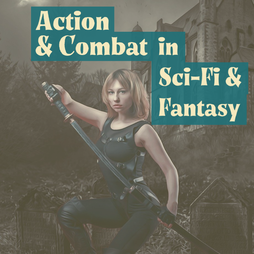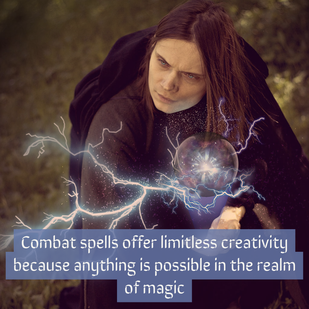|
Well-written action scenes are integral to many sci-fi and fantasy stories, from swashbuckling sword-and-sorcery to motorcycle chases through cyberpunk neon streets. Good combat sequences and action scenes happen fluidly and are part of the story's flow. Satisfying action scenes are simple to read but not so easy to write. In this series, I'm investigating what goes into a successful action sequence. I’m going to split the topic of magical combat into two subsets: supernatural and sorcery/wizardry. Also, are the Jedi from star wars using supernatural magic, or are they sorcerers? I don’t know. You’re going to have to yell louder; I can’t hear you. Supernatural Combat Supernatural is sort of a misnomer here because magic in this category comes “naturally” to the practitioner as part of their physiology. Vampires, fairies, and ghosts all fall into this category. As well as any creature or person who can innately perform magic. This is an important distinction, supernatural creatures don’t have to learn their magic, but they are not necessarily good at it. This means that young or newly magical creatures will not have as good control of their magical abilities. On the other hand, you don’t want to meet a thousand-year-old vampire in a dark alley. Supernatural creatures from lore (fairies, werewolves, etc.) have predetermined powers and limitations to guide combat. No one is bound by the rules of legends, but they can be a helpful guide. Sorcerous Combat Combat spells are fun to write. They are a chance for limitless creativity because anything is possible in the realm of magic. On the other hand, to guide the narratives, magicians often have a specialty. A magician may specialize in learned spells (often called wizardry) or potions. Different magical groups include: healing, natural (including the four elements or specializing in an element, i.e., pyromancy), necromancy, and psionics (mental powers). There’s also a personal favorite of mine, chaos magic, wherein the characters must contend with unpredictable results. By virtue of their innate abilities, a supernatural character may often be a specialist in one of the above areas. Although, an interesting character may want to work in magic that goes against their physiology. I’d read a story about a fairy-turned-necromancer. Selecting a magical specialty has a few advantages. Inexperienced characters may move up the ladder of their abilities with increasingly impressive displays of magic. A pyromancer may begin with little, uncontrolled fireballs and work up to targeted missiles of fiery destruction. Staging Magical CombatThe previously mentioned D20 Method for writing combat can also work for magical action, with spells or magical effects doing the damage instead of weapons. If you use this, you’ll either have to use magic from D&D books (there’s a ton) or come up with your own statistics for spell damage. Whether or not you use the D20 system, you’ll need to figure out the damage, duration, and lethality of magic effects. For example, if a psionic blast knocks the victim unconscious, how long does it last? Or, how deadly is a wound from a spirit blade, and so on. Also, mixing exciting regular combat with magical combat can make for an epic battle. Next UpSpeaking of epic battles, I had a lot of fun writing this blog series. It took forever to get through it because I was in the middle of a challenging time in my personal life. But, as always, this blog and your comments and participation is a wonderful little bright spot. This fall (which is in a few weeks already! what?) I’m starting a new blog series on writing villains. I can’t wait to do a deep dive into bad guys! Other Blogs in this Series:
0 Comments
|
Alison Lyke
Categories
All
Archives
November 2022
|



 RSS Feed
RSS Feed
